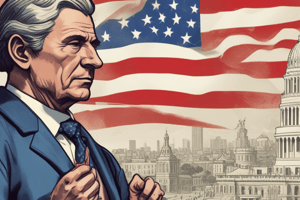Podcast
Questions and Answers
What significant changes occurred in domestic policy as a result of the World Wars?
What significant changes occurred in domestic policy as a result of the World Wars?
- Reduction of global influence
- Isolationist foreign policy
- Decrease in women's workforce participation
- Expansion of the federal government's role in the economy (correct)
Who is responsible for interpreting the law and ensuring the protection of citizens' rights in the U.S.?
Who is responsible for interpreting the law and ensuring the protection of citizens' rights in the U.S.?
- Members of Congress
- The President
- The Supreme Court (correct)
- State Governors
How many branches of government are established by the U.S. Constitution?
How many branches of government are established by the U.S. Constitution?
- Three (correct)
- Four
- Two
- Five
Which branch of government is responsible for creating laws and overseeing the executive branch?
Which branch of government is responsible for creating laws and overseeing the executive branch?
When was the U.S. Constitution ratified?
When was the U.S. Constitution ratified?
Flashcards are hidden until you start studying
Study Notes
A Brief Journey through History and Civics
As we delve into the realm of history and civics, we'll explore several pivotal moments that have shaped our understanding of citizenship, rights, and government. Let's set off on a voyage through time, from the American Revolution and the formulation of our Constitution, to the Civil Rights Movement and the world wars that expanded our global perspective.
The American Revolution and the Founding Documents
In the 18th century, a group of individuals, largely from English colonies, sought to forge a new nation based on the ideals of liberty and self-government. The American Revolution, a conflict spanning nearly a decade, culminated in the adoption of the Declaration of Independence in 1776 and the U.S. Constitution in 1787. The Constitution established a system of government based on the principles of checks and balances, with three branches: legislative, executive, and judicial, each designed to prevent the concentration of power.
The Civil Rights Movement
During the mid-20th century, the United States faced a period of intense struggle for social justice and equality. The Civil Rights Movement, a concerted effort to secure equal rights for African Americans and other marginalized groups, began in the 1950s and continued through the 1960s. Key events during this period included the Montgomery Bus Boycott, the 1963 March on Washington, and the passage of the Civil Rights Act of 1964 and Voting Rights Act of 1965.
World Wars
The two world wars of the 20th century profoundly affected American politics, society, and foreign policy. The United States entered World War I in 1917, and World War II in 1941. These conflicts exposed America's global influence, and the nation's role in defending democracy and freedom. The wars also brought significant changes in domestic policy. For instance, the federal government expanded its role in the economy, and women entered the workforce in unprecedented numbers.
Branches of Government
The U.S. Constitution established a system of three branches of government: legislative, executive, and judicial. Each branch has specific powers and responsibilities, designed to maintain a balance of power and prevent any one branch from becoming too powerful.
The legislative branch, Congress, is responsible for creating laws and overseeing the executive branch. Congress consists of two chambers: the Senate and the House of Representatives. Members of Congress are elected by the citizens of the United States to serve terms of two and six years, respectively.
The executive branch, headed by the President of the United States, is responsible for enforcing laws and leading the nation in both domestic and foreign affairs. The President has the power to veto legislation passed by Congress, and also serves as the Commander-in-Chief of the armed forces.
The judicial branch is responsible for interpreting the law and ensuring that the rights of citizens are protected. The U.S. Supreme Court is the highest court in the land and has the power to declare laws unconstitutional. Federal and state courts also help to administer justice and resolve disputes.
The Constitution
The U.S. Constitution is the foundation of our system of government. Ratified in 1788, it established a federal system of government, outlined the powers of the three branches of government, and guaranteed certain rights to the citizens of the United States. The Constitution has been amended 27 times, most notably with the addition of the Bill of Rights, which guarantees civil liberties and protections for individuals against abuses by the government.
As we traverse the rich tapestry of history and civics, we discover the enduring principles that continue to shape our collective identity. From the bold strokes of revolution and civil rights to the delicate balance of power between branches of government, each chapter in this grand narrative of American experience is a testament to the resilience of our democracy and the indomitable spirit of our citizens.
Studying That Suits You
Use AI to generate personalized quizzes and flashcards to suit your learning preferences.




